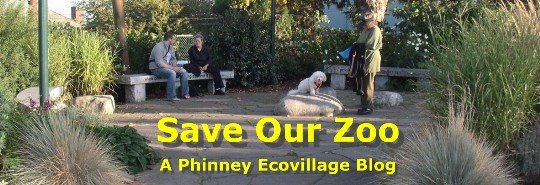Despite gloomy economic expectations all over the world for 2009, two entities remain upbeat in the downturn.
One is the New York Yankees, who spent $423.5 million to land three (count 'em) marquee stars they hope will draw hordes to the team's new $1.6 billion Yankee stadium starting in the spring.
The other is the Woodland Park Zoo.
On the strength of a new Humbolt Penguin exhibit and a phenomenon it terms "staycations," the Zoo expects 2009 attendance of 1.12 million, up around 30,000 from 2008 (as estimated) and the largest overall annual total since 1.2 million in 2001, the year Hansa the baby elephant went on exhibit. The headcount will rise, the Zoo says, despite increases in admission and parking fees at the zoo.
Starting May 1, the zoo’s seasonal admission price will increase to $16.50 for adults and $11 for children, up from last year's $15 for adults and $10 for children. The new rates apply to the summer only under a seasonal structure; on Oct. 1 they revert to $11 and $8. Seniors receive a $2 discount year-around.
Parking fees jump to $5, up half a dollar, in part to cover the city’s parking tax. In perhaps a more noticeable impact than the fee boost, the zoo wants to hire a private vendor and implement a metering system for parking. Ever sanguine, the Zoo hopes the system will be embraced as a convenience, since paid parkers can show stubs and be admitted without having to wait in line.
The Zoo's justification for raising ticket prices is that they are comparable to similar attractions such as the Aquarium, museums and special events. Zoo executives also feel admission fees are not price-sensitive. Patrons will pay what it takes because the zoo is a unique and popular family experience.
Still, admission fees have not endured the test of a downturn like the one faced today, typically characterized as the worst in three generations. And the widely theorized "lag time" for the recession to hit the Seattle area may not help matters. With WaMu shuttering its headquarters and laying off people, and with everything from hiring freezes to layoffs at Microsoft, the Seattle Times and other leading employers, combined with the airline industry's woes, who knows how deep the regional budget knife will cut into people's eagerness to pay for the "zoo experience"?
One upside the Zoo sees to current conditions comes with a phenomenon it calls "staycations," or stay-near-home vacations. With high gas prices and emerging economic pressures the past summer, the Zoo experienced its second-highest summer attendance since it began keeping track 10 years ago. Gas prices have since receded, but the overall economy has worsened to the extent that area residents may repeat the staycation phenom next summer as well.
Another factor in last year's attendance was the flamingo exhibit. New exhibits always draw folks out, and the Zoo expects nothing less of the penguin rollout this year.
Ironically, the Zoo's motivations for raising expectations somewhat parallel the Yankees, whose ownership substantially raised ticket prices for 2009. The price increases met with immediate grumblings which the head office feels a winning season will quickly subdue. If the penguin exhibit is the blockbuster the Zoo promises, higher fees may not even be an issue.
But the new-exhibit appetite could have a downside as well, if patrons come to expect something big every year. Hoping to duplicate the Hansa spike, the Zoo has engaged in repeated artificial inseminations of its Asian female, Chai. But to no avail. And a rhino exhibit initially promised for 2007 is not expected before 2011, if then.
Asked about the Zoo's high hopes in the face of a lagging economy, public-affairs director David Schaefer said via e-mail that the Zoo "is pretty well-managed and that the management is very conservative financially." The Zoo is "working pretty hard to manage through the difficult economic times."
Friday, January 2, 2009
Zoo Upbeat in Downturn
Subscribe to:
Post Comments (Atom)

No comments:
Post a Comment